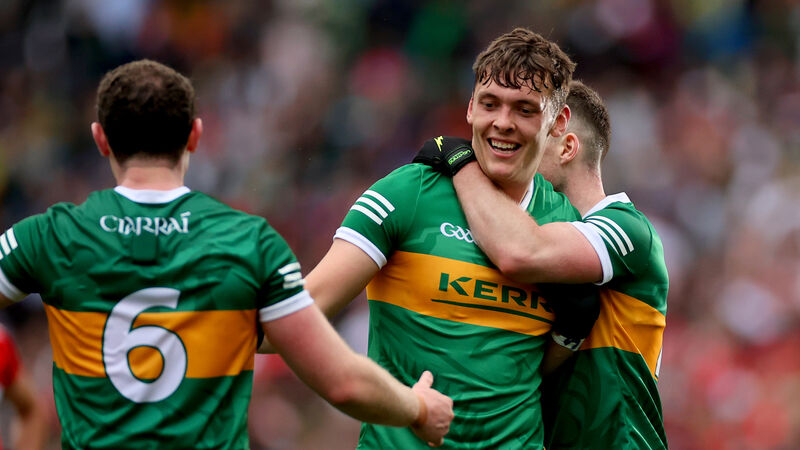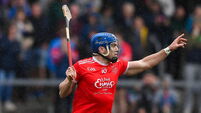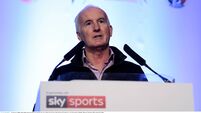Talking Points: Win over Derry even more satisfying as Kerry stay true to who they are

MAIN MEN: Kerry’s Tadhg Morley, David Clifford and Tom O'Sullivan celebrate after the game. Picture: INPHO/James Crombie
For Kerry, winning is all that has ever mattered but winning the Kerry way, even if that is bound up in adapting to the demands of the modern game, matters even more. A large part of Kerry’s first half struggles may have stemmed from going away from their principles of applying more pressure in defence and through the middle third, but the principles deeply encrypted into the core of Kerry’s DNA eventually saw them home.
It took Kerry over an hour to win a second Derry kickout but then they went into overdrive from that source. Kerry had backed off Odhrán Lynch’s kickouts in the second half to form a stronger defensive line higher up the pitch. But when time came late on to gamble and to force Lynch to go long on his restarts, Kerry won three of those kickouts and translated them into three points. They had finally cracked the Derry code.
More heat and pressure from Kerry meant more turnovers – and ultimately more scores. Derry turned over the ball just seven times in the first half, which led to 0-3. In the second half though, Derry’s 13 turnovers led to 0-5.
The detail in the data of those turnovers though, will haunt Derry as seven of those turnovers stemmed from shots, either saved, blocked or dropped short, which Kerry immediately converted into 0-3 at the other end.
Of Kerry’s 16 turnovers, seven came off kickpasses, but Kerry still never went away from their kicking game, even if a lack of precision of that kicking game into their attack did stifle their threat for a period in the second half. In total, in open play, Kerry kicked the ball 77 times (not including shots). As a comparison, Derry kicked the ball in open play on just 24 occasions.
And yet, what Derry were doing, was working until Kerry finally cracked it by staying true to what they are good at. Kerry got 1-9 off their own kickout. Derry only won two of Shane Ryan’s restarts over the 70 plus minutes, just one of which led to a Derry point.
Ryan’s save from Gareth McKinless in the 52nd minute was a pivotal moment in the match. Derry could have had three goals in the second half but, no matter what they’re faced with, Kerry will always be a dangerous force with David Clifford on board.
From 21 plays, Clifford scored 0-4 from play, as well as a mark, while he was fouled for three converted frees and had a hand in another score. Shane McGuigan had a brilliant first half when scoring 0-3 and being fouled for a converted free but McGuigan failed to get off a shot from play in the second half. McGuigan was fouled for three frees but only one of those was in the scoring zone.
It took Kerry an age to break Derry down and, while Derry had more shots than Kerry up until the last few minutes, their conversion rate of 23% in the second half was decisive, especially when it had been 80% in the first half. Kerry’s conversion rate dipped in the second half but it was still 56% in that period.
Derry will have huge regrets about those missed goal chances but they had to work much harder to get off those shots after the break. That was also evident on how Kerry limited Derry’s scoring threat off their own kickout; after shipping 1-7 off the Derry kickout in the first half, Derry only mined 0-1 off Lynch’s restarts after the break.
Finding a way to win was hugely satisfying for Kerry. But staying true to their principles, which decided how they won, made it all the more pleasing again for Kerry.
When Dublin go after the opposition, especially on their kickout, their commitment and intent to do such lethal damage from an opponent backed into the corner and on the ropes is like a python’s grasp; squeeze, squeeze and squeeze until there is no breath left.
Dublin’s numbers in the last quarter on Saturday were incredible. Monaghan turned over the ball just eight times in the first three quarters, coughing up 0-5 from that possession. Dublin applied such heat in the last quarter though, that Monaghan turned over the ball six times, with Dublin turning that possession into 1-4. After getting off just three shots in the third quarter, Dublin nailed eight of their last ten shots in that last quarter.
Dublin only won three Monaghan kickouts over the 70 plus minutes but they secured two of those in the last ten minutes, both of which they translated into scores. In between those two points, a pack of Dublin forwards hunted Rory Beggan down in possession on the second ball off his short kickout. Beggan just got the pass away but Stephen O’Hanlon picked the ball off the ground and Paul Mannion nailed the free.
Monaghan were heroic, as expected, but they just couldn’t sustain the kind of effort and accuracy levels required to take down the Dubs. An overall conversion rate of 56% was never going to be enough when it needed to be at least above 70%. Dublin restricted Monaghan to just three shots in the last quarter.
Once the Dublin squeeze comes on, it’s impossible to survive it.
Just after Donal Keogan lifted the Tailteann Cup on Saturday, the fireworks in the middle of the pitch blasted into the sky, the smoke still lingering in the air as Keogan began his acceptance speech. Meath were giddy with delirium by then but everyone in the stadium had been well entertained over the previous 25 minutes.
The game finally exploded into life in the 50th minute. Level at 1-5 to 0-8, there were more scores in those final 25 minutes (15) than there had been up to that point of the match.
Both sides played their part but Meath really stepped up, making all the big plays when the game was there to be decided. Their conversion rate in those last 25 minutes was a superb 82%, nailing nine of 11 shots, with one of those misses a goal chance where the final pass was just overcooked.
Some of those Meath scores were out of the top drawer but their construction was just as impressive, especially off their long kickout. In that final 25 minutes, Meath won all but one of their nine kickouts, and translated four of those long restarts into points. Meath also put such heat on Down in possession that Down turned over the ball 12 times in that last 25 minutes, compared to just six turnovers for Meath. Meath mined 1-2 from those Down turnovers.
Jack Flynn really showcased his class in that last quarter with four superb points from four shots. Three of those scores came from hard runs off the shoulder while the fourth was a superb lofted effort 40 metres from goal.
There was a theory beforehand that Meath may play into Down’s hands with their kicking and more direct game, especially off turnovers. Yet those principles really paid off for Meath especially in that last quarter.
Meath were the physically stronger side but, just as importantly, they looked fitter and better conditioned down that home straight, which was understandable considering most of these Meath players have been on the road longer than the majority of the Down squad.
Saturday felt like a million miles from Tullamore in late April when defeat to Offaly plunged Meath into the Tailteann Cup. Yet Meath embraced that challenge. And they finished out the competition in a way that every Meath supporter would have wanted them to in Croke Park.





